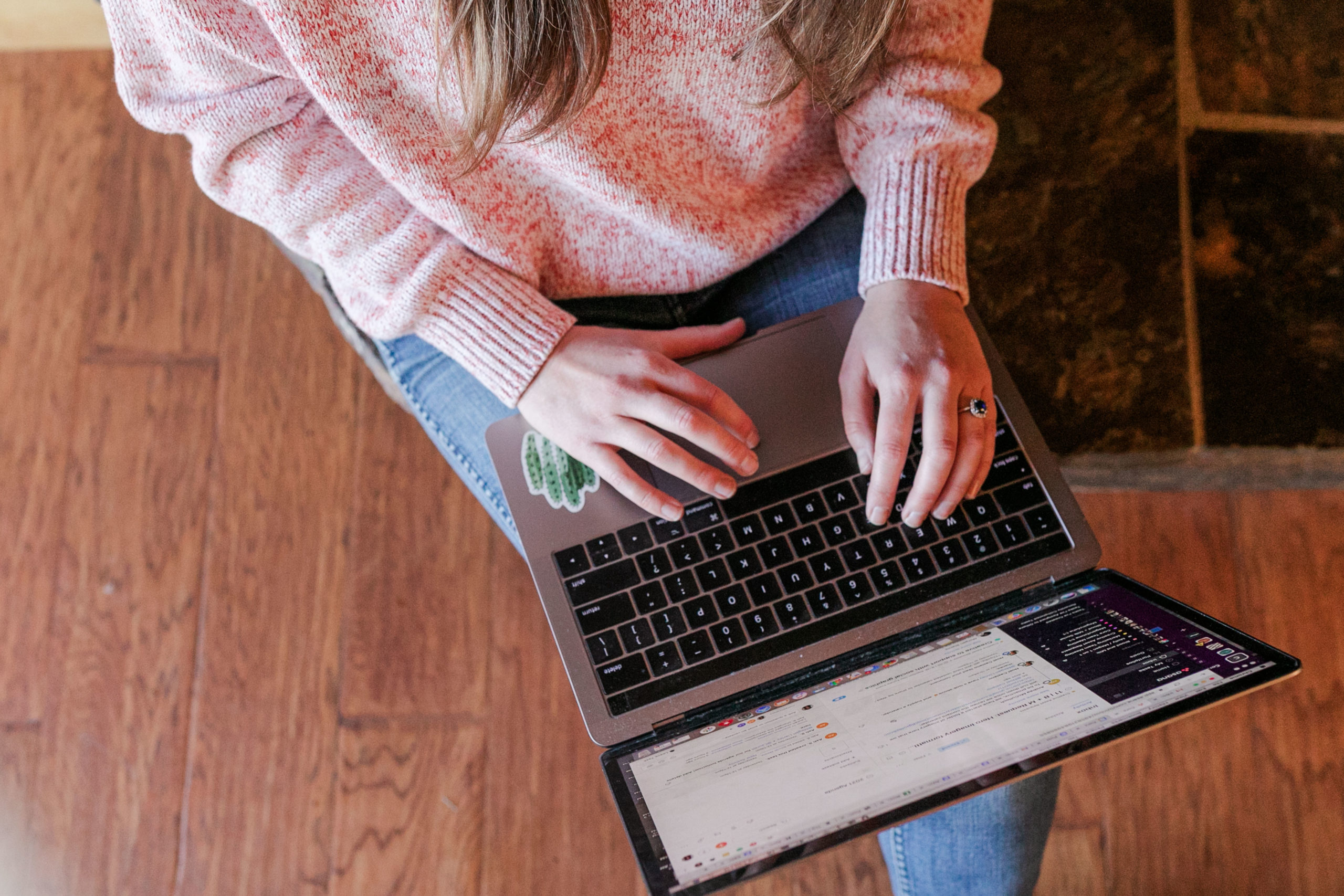We might have been hoping that 2021 would mean back to business as usual, but with COVID-19 remaining a worldwide issue, it might be a while before we head back into the office. I don’t know about you, but even with my work-from-home space set up to suit my style and my schedule purposefully primed for productivity, this winter has me feeling a little less motivated. What more can we do to make that WFH life work better for us while we’re waiting to go back to normal?
There’s actually a crucial aspect you might have missed, and it’s a big part of working from home — security. At the office, your employer has you covered when it comes to WiFi, virus protection, and the like, but it might not be something you’ve thought about on your laptop or home PC. Protecting your information is just as important as staying productive at home — whether you work for yourself or someone else.
Here are six work-from-home security tips to consider during COVID-19.
1. Keep Passwords Secure
You might think this one is obvious, but you’d be surprised at how many people use throwaway passwords like “1111” or “1234.” That might be easy to remember, but it’s also easy to guess — meaning it can be a security risk. Your passwords are important, so protect them!
A strong password has more than eight characters. It’s also essential to include a few numbers and symbols and avoid using sensitive information. Be sure to put them into a secure password manager and use two-step verification when possible. I use LastPass to store all my work passwords, and I have the handy Google Authenticator app on my phone.
2. Don’t Open Spam Emails
This suggestion probably seems like an internet basic. Everyone knows not to open emails that say they’re from a Nigerian prince, right? Nope. Spam scams earn thousands of dollars every year, because they’re not always so obvious, and people aren’t always so careful. Some spam emails are obvious, but others really do present like legitimate emails. Spammers are getting clever, so be wary of anything that’s from outside your work network or an email you don’t recognize.
You should never open an email that seems strange. If you get an unusual message from a client, it’s always best to call that person directly to verify what was sent. It’s much better to take that extra five minutes than to respond to a message that puts your security at risk. Everything that isn’t verified should go to the trash.
3. Use Encryption Software
If you’re using a computer on loan from the office, your company might already have encryption software installed. If you use a laptop from your office, ask your IT department to confirm. You can also download a specific program for whatever personal device you have for work. Either way, encryption is a must.
This secure software ensures unauthorized individuals can’t access your files, and it adds another wall of safety to your work info. If you use Windows, you should turn on BitLocker, and macOS users can activate FileVault. Your smartphone probably already has a proper program installed, but a browse through the app store is never a bad idea!
4. Separate Personal Devices
It can be tricky to separate your personal and work devices completely — just like it’s difficult to separate your work life and personal life when your office is your living room. It can be especially challenging when you use your own laptop to work. That said, you should find a way to keep these two components separate — both for your productivity and for security purposes.
Here are a few points to remember:
- Don’t pay bills on your work computer.
- Send job-related emails from your work account.
- Use different browser accounts for work and personal tasks — Google Chrome even makes it easy to set up saved browsers linked to different email accounts.
- Remove work apps from your personal phone and tablet.
- Keep your kids’ schoolwork, your partner’s video games or your roommate’s files off your work computer.
These tactics might take a bit more time, but they’re effective — and they’ll keep you on track.
5. Install an Anti-Virus Program
You never want to be on the receiving end of a cyberattack, but it happens to the best of us. It doesn’t take much to click a wrong link that downloads a virus onto your device. If you use an anti-virus program, you won’t have to worry about keeping your eyes peeled for internet threats — the program will protect you. Be sure to choose a credible option for your specific device.
6. Protect Your Internet Router
Here’s a work-from-home network tip — your home internet connection won’t always be secure. In fact, it could be easier than you think for hackers to access your Wi-Fi router — but with a secure connection, you won’t just speed up your internet connection; you’ll keep it private.
Make sure your router has a solid password. You can also consider a virtual private network, or VPN, to take security measures a step further. Never use a public network, like at a library, for work-related purposes — although that’s one problem COVID-19 might have solved for you.
Try These Work-From-Home Computer Tips for Better Security
Take these protective tech precautions to make sure your work stays safe — and your time is well spent. Feeling good about your at-home security will help you get out of that winter slump and boost work-from-home efficiency without worrying about tech issues or compromised data. Breathe a sigh of relief — you’ve still got that WFH game.
 Using Trunk Club to Update My Spring/Summer Wardrobe
Using Trunk Club to Update My Spring/Summer Wardrobe 5 Tips For Styling a Simple Summer Dress
5 Tips For Styling a Simple Summer Dress 5 Ways to Style a Bandana
5 Ways to Style a Bandana 3 Different Ways to Curl Your Hair
3 Different Ways to Curl Your Hair How to Master the 5-Minute Makeup Routine
How to Master the 5-Minute Makeup Routine Amazon Beauty Buys Under $25
Amazon Beauty Buys Under $25 3 Ways to Make Your next Trip More Memorable
3 Ways to Make Your next Trip More Memorable Tips for Digital Spring Cleaning and Organizing
Tips for Digital Spring Cleaning and Organizing Color Trend: Marigold
Color Trend: Marigold Mental Health Update: The 3 Major Changes I Made to Get Out of Depression
Mental Health Update: The 3 Major Changes I Made to Get Out of Depression 5 Unexpected Ways to Unwind After Work
5 Unexpected Ways to Unwind After Work How to Know You’re in a Controlling Relationship
How to Know You’re in a Controlling Relationship 4 Questions I get Asked as a Professional Resume Writer
4 Questions I get Asked as a Professional Resume Writer How to Make Friends at Work
How to Make Friends at Work Getting Out of the ‘Busy’ Mindset
Getting Out of the ‘Busy’ Mindset Ask Amanda: How do I pursue the career I want without formal training?
Ask Amanda: How do I pursue the career I want without formal training? Ask Amanda: How Do I Find a Therapist?
Ask Amanda: How Do I Find a Therapist? Ask Amanda: How do I stop being jealous in my relationship?
Ask Amanda: How do I stop being jealous in my relationship?




Lillian Gray Says
I was really in need of this type of blog since I’m really struggling with being lazy and working from home. I had no will to do any chores but now I think I kind of have some tips that I would love to try and see if it helps or not. Thanks for sharing.
Jack Milgram Says
Lillian Gray, you’re not alone. I think I’m a couch potato by nature. Anyway, does anybody have advice on which anti-virus is better?
Glenda Melancon Says
Informative Tips! Really In this article, you shared some effective technical tips to work from home, I totally agree with all of these points, Actually, I am also working as a freelance academic advisor and contributor at this website https://sks23cu.net/dwqa-question/dwqa-question_category/questions/algebra where we answered different types of questions about Algebra. So I hope this advice will be helpful to continue working from home that’s why I much appreciated the author for sharing these excellent tips with us.
Forki silikon Says
Thanks!
Volodimir Says
I love your comments here!
Emma Says
Now this is a very popular system, due to the pandemic, many have switched to remote work, your business can have a whole remote team. Only professionalism is important here, not physical presence in the office. If necessary, everyone has the opportunity to consider it staff augmentation services here
Emma Says
Thanks for sharing your experience, it’s really appreciated. When I started working from home, I had problems connecting my mouse and webcam. Everything turned out to be very simple, it was enough to download the necessary drivers and I found logitech drivers here
Benjamin Says
These are great solutions, thank you. In fact, I use a lot of technical nuances both for work at home and in my work to ensure the best security of even future products. I am a programmer and this is very important. Also, while studying nodejs security, I found a lot of solutions on how to make web products better for my company.
Veronika Says
You must understand that the importance of cyber security is growing. In essence, our society is more technologically dependent than ever before, and there is no sign that this trend will slow down. I advise you to learn more about the services of proxybros.com
Scott Says
I agree with the comment above that the situation can turn out differently at any time and there is nothing you can do then, so https://ug-gwc.de/ and training are the best tools.
Macar Says
I don’t agree, the best service is bildquelle angeben here
billyoberts Says
React Native development services have revolutionized the way mobile applications are built. Its cross-platform compatibility, code reusability, native-like performance, and vast ecosystem make it a preferred choice for businesses looking to develop robust and cost-effective mobile apps. Whether you are a startup, an SME, or an enterprise, React Native can help you accelerate your mobile app development process and deliver exceptional user experiences across platforms.
billyoberts Says
React Native development services have revolutionized the way mobile applications are built. Its cross-platform compatibility, code reusability, native-like performance, and vast ecosystem make it a preferred choice for businesses looking to develop robust and cost-effective mobile apps. Whether you are a startup, an SME, or an enterprise, React Native can help you accelerate your mobile app development process and deliver exceptional user experiences across platforms. Read more – here .
jav Says
If you would like to take much from this article then you have to apply such methods to your won web site.
reverse lookup Says
This is a great tip particularly to those new to the blogosphere.
Short but very precise info… Thanks for sharing this one.
A must read article!
timnas4d tahu Says
For latest information you have to visit the web and on world-wide-web I found this site as a best site for latest updates.
Alicia Ortego Says
Embracing the convenience of working from home is a positive shift, but let’s not overlook the crucial aspect of maintaining work-life balance. It’s easy to let professional boundaries blur in the comfort of our homes. A dedicated workspace and clear-cut work hours can help strike that balance. Equally important is not forgetting about our children amidst work demands. Establishing a routine that accommodates family time ensures we’re not only productive professionals but also present parents. Let’s embrace the flexibility of remote work while keeping these essential elements in mind, fostering a harmonious blend of career and family life. Don’t forget about nurturing that bond you have with your kids. There are some tips here https://aliciaortego.com/best-family-bonding-activities/
ass fucking Says
“It’s going to feel weird at first,” Ashley Cobb,
founder and host of Sex With Ashley and sex
toy reviewer, tells SELF. But what exactly are we talking about
and where does this threshold which separates sex that is okay from sex that is rape come from?
Homemade penis pumps are easy to make. Older evidence suggests that penis pumps can improve ED and preserve the size of the
penis after a radical prostatectomy. Do penis pumps really work?
Although Ji Yanzhi did penis enlargement surgery cost ohio not
show it, Tian Jie had this kind of premonition, and always felt that Ji Yanzhi had some sort
of backhand waiting for Tian Bing. The corners of the
man is lips curled up Tian Lianzong Oh, how to help my husband with
erectile dysfunction Blue Gummies For Erectile Dysfunction you will remember it today He stepped out of
the circle of fire I am going to make rumors that I will refine
this day Several elders of Tianlianzong led thousands
of Tianlianzong disciples to surround the center. At the station, just before we started,
an old man who had heard us speaking English, came up and
spoke to us.
vehicle rfid readers Says
I couldn’t refrain from commenting. Veryy well written!
Feel free too sur to mmy blog post … vehicle rfid readers